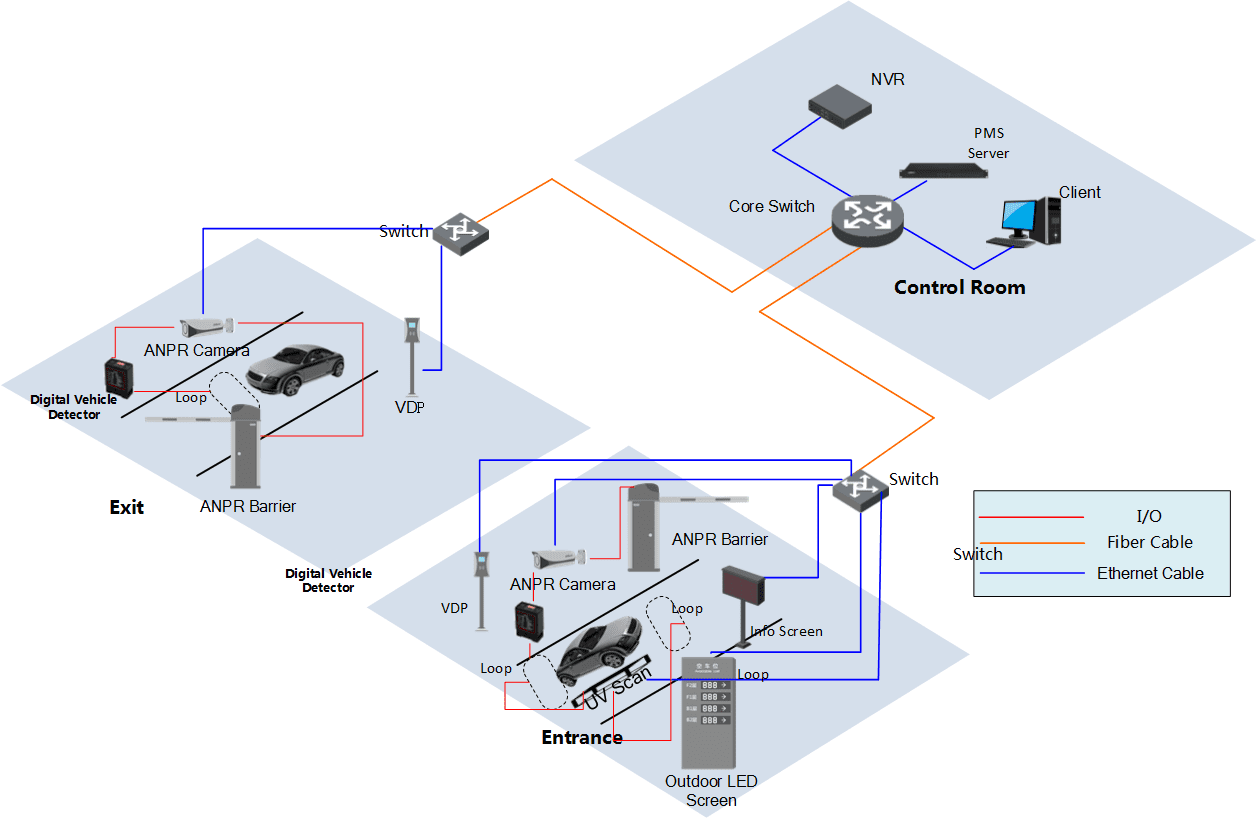
Considerations When Planning a New Intercom System for an Office, School, or Industrial Facility
When planning a new intercom system for an office, school, or industrial facility, a range of factors must be taken into account to ensure optimal functionality, security, and compliance.
Effective planning for a new intercom system is essential when it comes to commercial property security. With various options on the market, selecting the right intercom equipment is only the first step. A well-chosen system should seamlessly integrate with other security measures, such as CCTV or access control systems, to create a comprehensive safety network. Additionally, understanding local regulations is crucial to ensure compliance and avoid potential issues down the line. These factors are key in creating a robust and efficient communication system tailored to the unique needs of commercial properties.
In this article, we dive deeper into these new intercom system considerations for commercial property owners. We’ll cover important aspects like leading intercom brands, integration capabilities, and specific requirements for areas like Newcastle, NSW. With this information, business owners can make informed decisions that enhance property security, streamline communication, and support smooth day-to-day operations.
1. Assessing Facility Requirements
- Identify Key Areas: Determine the critical areas where intercom communication is necessary. In offices, these include entry points, reception areas, and meeting rooms. Schools may require intercoms at classroom doors, administration buildings, and gates, while industrial facilities often need coverage in loading bays, control rooms, and safety zones.
- Purpose of the System: Establish whether the system’s primary role is communication, security, or a combination of both. For example, schools may need intercoms for efficient communication across classrooms, while industrial facilities may require systems that facilitate both regular communication and emergency alerts.

For example, in the image above, the Dahua Entrance and Exit Control Intercom System is integrated with an Access Control solution for a car parking area.
2. Types of Intercom Systems
- Wired vs. Wireless Systems:
- Wired Systems: Provide consistent communication quality and security, ideal for schools and industrial sites. They require more installation effort but are generally more reliable.
- Wireless Systems: Offer more flexibility and are quicker to install, making them suitable for offices and temporary setups. However, they may be susceptible to signal interference.
- Video vs. Audio Intercoms:
- Audio Intercoms: Suitable for basic communication and smaller offices.
- Video Intercoms: Provide visual verification, making them essential for schools and industrial sites where verifying visitor identity is critical for safety.
3. Leading Intercom Brands
- Aiphone:
- Aiphone offers a broad range of solutions, from simple audio intercoms to advanced IP video systems. It is ideal for schools due to its robust performance and compatibility with other systems.
- Dahua:
- Dahua is renowned for its IP-based intercoms that integrate seamlessly with CCTV, access control, and alarms, making them suitable for industrial and commercial facilities.
- Hikvision:
- Known for high-quality video and audio systems, Hikvision intercoms are widely used in high-security environments and industrial sites. They integrate smoothly with CCTV and alarm systems, offering extensive remote management capabilities.
- Bticino:
- Bticino’s intercom systems are well-suited for office environments, are user-friendly and aesthetically pleasing, and have robust integration capabilities for building management systems.
When planning an intercom system, consider the following features to ensure the system meets your specific needs:
- Audio and Video Capabilities: Decide whether you need video capability for visual verification or whether audio-only intercoms will suffice.
- Hands-Free Operation: For high-traffic areas or industrial environments, hands-free options ensure ease of use and safety.
- Remote Management: Opt for IP-based systems that allow management through smartphones, tablets, or computers, enabling staff to operate the system from anywhere.
- Integration with Access Control: Integration with doors, gates, and barriers allows users to grant or deny access easily.
- Emergency Call Buttons: Essential for schools and industrial facilities, emergency buttons allow for immediate communication with security teams during crises.
- Weatherproof and Vandal-Resistant Units: Industrial facilities and schools may require intercoms with rugged designs for outdoor use and high-risk areas.
- Noise-Cancelling Microphones: Ensures clear communication in noisy environments, particularly important for factories and industrial sites.
- Multi-Zone Communication: Supports communication across different building zones, ideal for larger facilities like schools and industrial sites.
- Recording Capabilities: For security purposes, some systems allow recording of audio and video communications, which can be vital for safety compliance and monitoring.
- Two-Way Communication: Enables direct communication between users, whether it’s staff to staff, teacher to student, or security to visitor.
- Integration with Other Systems: Ensure the intercom can integrate with alarms, PA systems, and CCTV for a comprehensive security approach.
5. Integration with Other Security Systems
Integrating intercoms with other security systems ensures a unified and efficient approach to communication and safety:
- CCTV Integration: Allows users to verify visitors through live video before granting access. This CCTV integration is crucial for schools and industrial facilities where safety is paramount.
- Access Control Integration: Connects intercoms to electronic locks, gates, or barriers, allowing authorised personnel to grant access remotely. Access Control integration is especially beneficial for industrial sites where safety protocols require controlled access.
- Alarm Systems Integration: Intercoms linked with alarms or a PA System can automate emergency notifications, enhancing the facility’s overall safety.
- Integration with Network Devices: Modern intercom systems can be managed through smartphones, tablets, and computers, making it easier to operate across offices, schools, and industrial sites.
- Centralised Control: Intercoms that integrate with existing security systems can be managed from a central control room, offering a streamlined approach to safety management across large facilities.
6. Integration with PA Systems
An effective communication system often requires intercom integration with Public Address (PA) systems:
- Enhanced Communication: Integrating the intercom with a PA system allows for broader communication capabilities, enabling announcements to be made simultaneously through intercoms and PA speakers.
- Emergency Announcements: Integrating the intercom with the PA system in schools and industrial facilities can ensure emergency messages reach all parts of the building quickly.
- Zoned Paging: This feature enables messages to be directed to specific zones, ensuring that the right information reaches the relevant areas, whether it’s a school campus, an office building, or a large industrial site.
- Network-Based Integration: IP-based intercoms can seamlessly connect to network-based PA systems, allowing for flexible communication through existing network infrastructure.
- Wireless Integration: Some wireless PA systems can also connect with intercoms, providing an additional layer of communication flexibility for temporary setups or mobile units.
7. Regulatory and Local Council Requirements in Newcastle, NSW
- Building Codes and Compliance: Intercom systems, especially in schools and industrial sites, must comply with the National Construction Code (NCC), which includes fire safety standards and emergency communication requirements.
- WHS (Work Health and Safety) Requirements: Industrial facilities must ensure intercom systems meet WHS standards, which mandate clear communication channels for worker safety, particularly in high-risk environments.
- Council Approvals: Depending on the scale and nature of the installation, local council approvals may be required, particularly for outdoor installations. Schools must ensure compliance with the NSW Department of Education’s safety standards.
- Privacy Laws: Systems with video recording capabilities must comply with Australian privacy laws, ensuring consent for video and audio recording and its use for safety and security purposes only.
- Routine Maintenance: Regular checks and servicing are crucial to maintain system reliability. This is particularly important for industrial sites, where communication is critical for safety compliance.
- Scalability: Choose an intercom system that allows for future upgrades or expansions. IP-based systems are generally more scalable, making them suitable for growing offices, schools, or industrial facilities.
Conclusion
Planning a new intercom system for an office, school, or industrial facility involves many considerations, from selecting the right type of system to ensuring seamless integration with other security systems. It’s also vital to comply with local regulations in Newcastle, NSW, and factor in long-term scalability and maintenance. Leading brands like Aiphone, Dahua, Hikvision, and Bticino offer advanced, integrated solutions that can enhance communication and security across various facilities. By consulting with experts and tailoring the system to your specific needs, you can ensure a future-proof, efficient, and compliant intercom solution.
For more information on designing and installing an intercom system for your facility in Newcastle, feel free to contact our experienced team.

AVE Technologies are your local Hunter Valley, Newcastle, Central Coast, and regional NSW’s commercial electrotechnology experts who can design, build, and deploy your Intercom solution.
We offer an extensive selection of security cameras, alarms, CCTV, intercom, PA systems and access control management systems that can be conveniently operated using user-friendly smartphone apps. With this feature, you can enjoy advanced and effortless management of your security solutions right at your fingertips.
Get in touch to learn more about how an integrated Intercom solution can help your business!

